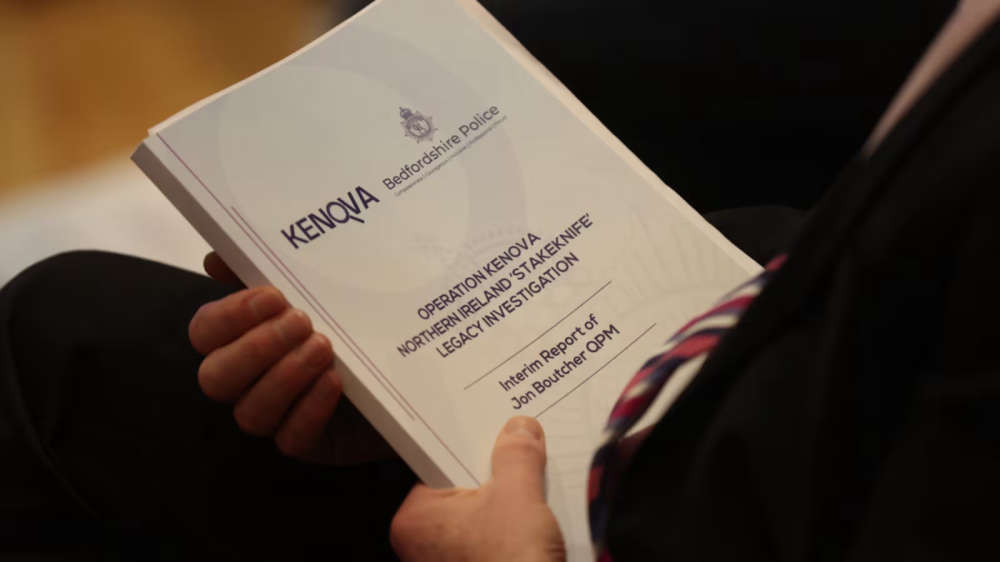
By Jonathan McCambridge (PA)
MI5 files were not deliberately withheld from an investigation into the IRA agent known as Stakeknife, a review has found.
The review was carried out following discovery of the material last year, after the investigative stage of Operation Kenova had already been completed.
Kenova, a major investigation into the operations of “Stakeknife”, thought to be the British Army’s top agent inside the IRA, published its interim report in 2024 finding that more lives were probably lost than saved by his actions.
Despite the findings, the public prosecutor did not to pursue any cases.
Stakeknife, widely believed to be west Belfast man Freddie Scappaticci, died in 2023 at the age of 77.
Former head of Kenova and current PSNI Chief Constable Jon Boutcher said last year it was unacceptable that MI5 had discovered the material so late and that the files appeared to contain “significant new material which appears to point to new investigative leads not previously known”.
The review into the late disclosure of the four separate sets of documents was carried out at MI5’s request by a former assistant commissioner of the Metropolitan Police, Helen Ball.
A summary of her findings has been published on the Kenova website.
She said: “I have not seen evidence of a deliberate attempt to withhold the material identified in 2024.
“Therefore, I have concluded that none of the material was deliberately withheld from Operation Kenova at either an individual or an organisational level.
“However, MI5’s disclosure exercise drew on historic information management practices for Northern Ireland material which were not as strong in the past as those that MI5 had in place for its other material.
“This meant in some cases that material was not properly stored and indexed when it should have been, and in others that it was indexed in a way that meant its relationship to Operation Kenova’s remit was not recognised.”
Ms Ball added: “In addition, MI5’s approach to the disclosure exercise was, as agreed with Operation Kenova, to respond to requests for information provided to it.
“MI5 did not conduct a broader assessment of its own position in relation to Operation Kenova’s investigative remit and the material it might hold.
“Had it done, some of the material might have been identified earlier.
“So might it have been if MI5 had maintained stronger relationships with the Operation Kenova team.”
She added that MI5 staff had carried out “further extensive searches and no similar material has been found since”.
Current Kenova head Sir Iain Livingstone said: “It is of course deeply regrettable that material was discovered and disclosed after the investigative phase of Kenova had concluded and after the Director of Public Prosecutions for Northern Ireland had made decisions concerning prosecutions of the Kenova cases.
“The circumstances and relevance of the non-disclosed material will form part of the Kenova final report which is due to be published later this year.”
Some 32 people, including former police, ex-military personnel and people linked with the IRA, were considered for prosecution on a range of charges from murder and abduction to misconduct in public office and perjury as a result of the Kenova investigation.
The Public Prosecution Service (PPS) in Northern Ireland found there was insufficient evidence to pursue any cases.

The investigation took seven years to examine the activities of agent "Stakeknife", who was Belfast man Freddie Scappaticci. PICTURE COLM LENAGHAN


 Benn to discuss legacy issues with Harris at Hillsborough Castle
Benn to discuss legacy issues with Harris at Hillsborough Castle
 Pipe bomb devices found following Cavehill security alert
Pipe bomb devices found following Cavehill security alert
 Legal papers lodged in challenge to Irish language signs at Belfast station
Legal papers lodged in challenge to Irish language signs at Belfast station
 Bikers to descend on Westminster for veterans protest against Legacy Act repeal
Bikers to descend on Westminster for veterans protest against Legacy Act repeal
 Guidance sought over future of colourful parakeets in Belfast park
Guidance sought over future of colourful parakeets in Belfast park